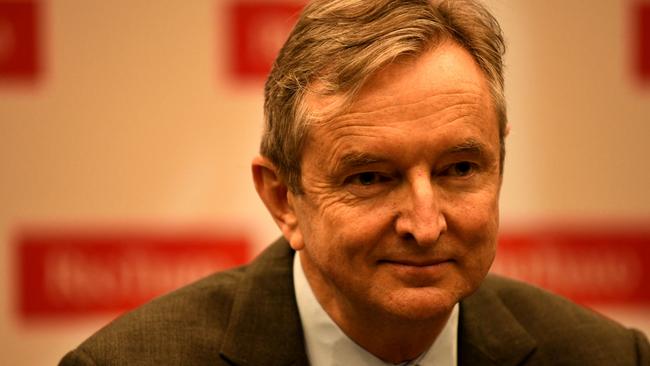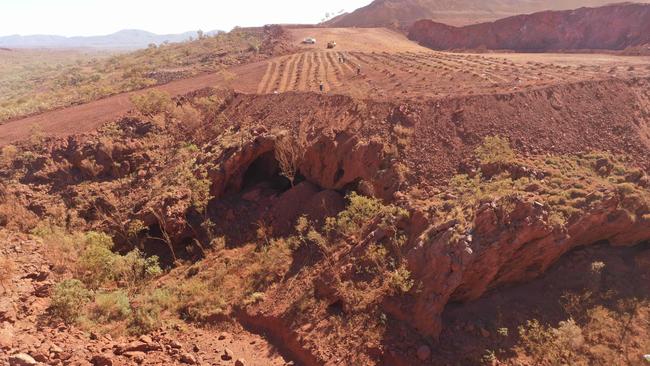Rio Tinto stung over Juukan Gorge cave scandal
Rio Tinto has suffered one of the biggest shareholder backlashes in Australian corporate history, with close to two thirds of its shareholders issuing a protest vote.

Rio Tinto has suffered one of the biggest shareholder backlashes in Australian corporate history, with close to two thirds of its shareholders issuing a protest vote after Rio shattered its international image through the destruction of 46,000 year old heritage sites at Juukan Gorge.
But despite the shareholder sting, both the Rio chairman and chief executive Jakob Stausholm were upbeat about the company’s outlook on the back of renewed talk of a new resources “supercycle” as the world recovers from the pandemic.
Rio chairman Simon Thompson told shareholders he was concerned that rising political tensions between Canberra and Beijing could have further ramifications for free trade on global markets, but said Rio did not want to become involved in the politics of the situation, and was primarily focused on its direct relationships with its Chinese customers and partners.
But Mr Thompson was again forced to defend the company’s decision to allow former chief executive Jean Sebastien Jacques to depart Rio with his entitlements largely intact in the wake of the Juukan Gorge disaster.
Across its London and Australian dual-listed structure, 60.8 per cent of shareholder votes were cast against the mining giant’s remuneration report, handing the Rio board a stark message about the company’s handling of the Juukan Gorge debacle.
Key proxy advisers recommended a vote against the Rio remuneration report amid estimates that Mr Jacques, former iron ore boss Chris Salisbury and former corporate affairs chief Simone Niven collectively left the company with more than 765,000 Rio shares, worth about $96.2m at current prices, after losing their jobs over the company’s response to the destruction of the ancient heritage sites.

The vote is one of the most significant protests in Australian corporate history, though well below the 88 per cent rejection of NAB’s pay report in the wake of the banking royal commission in 2018, and marginally below votes against AMP executive pay in 2018 and 2020 – which hit 61.5 per cent and 67.3 per cent respectively.
Rio director Megan Clark, head of the company’s sustainability committee when the heritage sites were blasted, also saw a substantial shareholder protest against her re-election to the board, with 26.48 per cent of votes cast against her.
Mr Thompson will stand down as Rio chairman when a replacement is found and leave the company’s board at next year’s annual meeting.
Speaking in the wake of the AGM, he told reporters he understood why shareholders were angry, but said the company had little choice but to allow the trio to depart in good standing, keeping the bulk of their entitlements intact.
“The conclusion that we came to – taking into consideration that they also forfeited their jobs – was that the financial penalty was, in the best judgment of the board, the maximum that was legally defensible,” he said.
“We have significantly strengthened our remuneration policy in the light of what we have learnt from Juukan. So we have increased the discretion that the board can exercise for events that are not illegal, which don‘t necessarily result in financial loss, which certainly don’t reflect fraud or dishonesty or malfeasance, but nevertheless have a very significant, damaging effect on Rio Tinto’s reputation and our social licence to operate.”
Despite the embarrassing result of the shareholder meeting, both Mr Thompson and Mr Stausholm were upbeat on Rio’s outlook for the year, with the Rio CEO telling reporters the outlook for China’s growth and global resources demand was looking very strong.
“I‘m educated as an economist and you look at the global GDP numbers and they’re not very impressive. But of course it covers over the fact we’ve had certain business sectors that under COVID have completely collapsed and that has actually been compensated by the more physical economy and more than anything by the physical economy of China,” he said.
“And there is probably an element of it that might not be able to run at as high a speed as it does right now, but it looks very robust. The other thing is if you look at China, it‘s still a developing economy and if you compare on a number of economic factors if they continue as they have done for many years, they can continue for a long period of time.
“And that has an impact basically on most of our commodities. It’s not just iron ore, it’s also the demand for copper, for aluminium and now what we see as well is huge increase in electric vehicles that stimulates commodities like lithium.”
Mr Thompson said Rio remained concerned about the impact of political tensions between Beijing and Australia, the US and the UK, but said Rio was focused on maintaining its relationships with Chinese customers, despite the rising political tensions, which flared again on Thursday as China suspended the China-Australia Strategic Economic Dialogue in a tit-for-tat response to the Morrison government’s move to tear up belt-and-road agreements with Victoria.
China’s dependence on Australian iron ore remains largely immune from the deepening political divisions, but the Rio chairman acknowledged Rio’s “complex” relationship with China, given its reliance on the country as a buyer and its own Australian mines as a supplier.
“We do have a complex relationship with China. It is our biggest customer, our biggest single shareholder is also Chinese. It is an increasingly important supplier and technology partner,” he said.
“We are focused on trade. That‘s what that’s what we as a company need more than 90% of our products cross at least one border. So free trade is really our lifeblood. And we support the whole principle of free trade, there may well be political differences that occur between China and Australia or China and Britain.
“But certainly in our discussions with, with our shareholders, with our suppliers, with our customers there, we are focused on trying to meet their needs, and trying to do so better than the competition. And I think that is how we should continue to try and safeguard our relationship with China.”
Rio shares closed up $1.22 to $125.76 on Thursday.

To join the conversation, please log in. Don't have an account? Register
Join the conversation, you are commenting as Logout